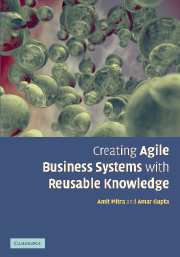Book contents
- Frontmatter
- Contents
- List of boxes
- List of figures
- List of tables
- Foreword
- Preface
- Acknowledgements
- Introduction
- 1 On the nature of reality and the nature of business
- 2 The object at the root of it all
- 3 The nature of attributes
- 4 Domains and their expression
- Appendix: Key shared components of knowledge
- Bibliography
- Index
4 - Domains and their expression
Published online by Cambridge University Press: 11 September 2009
- Frontmatter
- Contents
- List of boxes
- List of figures
- List of tables
- Foreword
- Preface
- Acknowledgements
- Introduction
- 1 On the nature of reality and the nature of business
- 2 The object at the root of it all
- 3 The nature of attributes
- 4 Domains and their expression
- Appendix: Key shared components of knowledge
- Bibliography
- Index
Summary
Silent and void,
It stands alone and alters not,
It moves but does not tire.
… I know not its name
… I call it the way
(Chinese philosopher Lao Tzu, 6th century BC)This chapter discusses the concepts of pattern and measurability. More importantly, these concepts are delineated in intuitive manner, without requiring mathematical sophistication. The chapter addresses the spectrum of meanings, from those that precisely quantify and measure numerically, to those that are purely qualitative. It describes components, configurations, and patterns of information that derive these meanings and eventually lead to the very concept of existence and meaning itself. The concepts are illustrated with examples from diverse areas.
Attributes have meanings. So have their values. Domains are the wellspring of meaning. Domains are sets of values. These values are measures of a meaning.
What does being a measure of meaning mean? Consider a room. Assume it is 30 feet long, 20 feet wide, and 10 feet high. These numbers describe the dimensions of the room. However, by themselves the numbers are only numbers. They mean nothing. Numbers only measure magnitudes, not meaning. Moreover, different numbers might describe the same dimensions. For example, measured in inches, the same room would be 360 units long, 240 units broad, and 120 units high. The larger numbers do not mean that the room has some how expanded; they only mean that the values of length, breadth, and height, i.e., the meaning of these values, have been expressed by mapping them to different sets of numbers.
- Type
- Chapter
- Information
- Creating Agile Business Systems with Reusable Knowledge , pp. 170 - 326Publisher: Cambridge University PressPrint publication year: 2007



